Mama Fish / Rio Youers
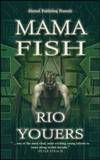 Shroud Publishing / June 2009
Shroud Publishing / June 2009
Reviewed by: Vince A. Liaguno
There are writers who are so talented that they can make you see the external manifestations of horror in all their full-blown Technicolor ghastliness. And then there are even more talented writers who make you feel horror’s heartrending internal effects. Rio Youers falls squarely into the latter category.
Mama Fish is proof that big things come in small packages. This tightly-written 91-page novella follows protagonist Patrick Beauchamp, from his days trying to befriend Harlequin High School’s resident misfit to his adult life more than two decades later. The story begins in 1986, with Patrick fascinated by the class oddball, Kelvin Fish, “the square peg, the kid that doesn’t fit.” As Patrick tries to reach the reticent Kelvin, he discovers that despite his own ability to fit in by going through all the motions of teenage convention – debate club, team sports – that he’s also a square peg in a world full of round holes. This unspoken kinship leads to Patrick’s desire to know more about Kelvin, and his speculation about the strange boy’s home life and family brings him to a pivotal moment involving an ill-fated encounter with bullies that leads to an increasingly bizarre (and ultimately tragic) sequence of events.
Mama Fish is a hard work to categorize – there are decidedly horrific moments, with bits of science fiction and surrealism thrown in amongst the richer coming-of-age material. To Youers credit, he uses the parallel narrative threads between teenage Beauchamp and adult Beauchamp to maintain a steady pace in which the tension mounts and pages turn faster. He imbues Mama Fish with a deceptive literary lushness that belies his crisp, economical prose:
Belief is coupled with the soul, so it stands to reason that if the soul is eternal, so too is belief. However, this is not the case; age generates wisdom, and wisdom engulfs belief. With every morsel of fact or reality, our soul loses its shine. We die inside.
Mama Fish is a highly readable yet thematically heavy story that takes on everything from the loneliness of the teenager’s search for connection and self to the gap that separates generations, from the injustices of fate to the rectifying power of karma. It’s the speculative fiction bridge between The Breakfast Club and The Big Chill, full of truth, perspective, and an emotional resonance that will haunt you long after the last shocking twist.
Purchase Mama Fish by Rio Youers.
Rot / Michele Lee
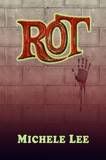 Skullvines Press / August 2009
Skullvines Press / August 2009
Reviewed by: Vince A. Liaguno
Zombie outbreaks are about as commonplace in horror fiction as reality shows are on television these days, having seemingly eclipsed haunted houses and werewolves combined and perhaps only second in market saturation to the vampire. We’ve seen the undead take to the high seas (Brian Keene’s Dead Sea) and hobnob with the likes of Jane Austen (Seth Grahame-Smith’s Pride and Prejudice and Zombies) and Dante Alighieri (Kim Paffenroth’s Valley of the Dead). There have been manuals written on how to survive a zombie attack (Max Brooks’ The Zombie Survival Guide) and even a book of zombie Christmas carols (Michael Spradlin’s It’s Beginning to Look a Lot Like Zombies). Even Chicago’s Columbia College offers a three-credit course on the undead called Zombies in Popular Media.
But just when the sub-genre appears ready to cannibalize itself with cuteness, along comes something with some real…meat.
Michele Lee’s Rot is an impressive debut novella that applies everything we’ve come to know as readers about the zombie and adds a weighty sociological twist that will surprise in its implications.
The Silver Springs Specialty Care Community is a residential care facility for the undead who are willed back to life by loved ones not ready to let go only to be promptly discarded when the realities of caring for a loved (undead) one prove too much to bear. The facility offers daily exercise and raw meat to keep zombie hunger at bay, and even a promise to re-kill the undead resident upon his or her inevitable decline into savagery or complete decay.
Enter protagonist Dan, a retired military veteran whose combat training makes him an ideal security guard at Silver Springs. During his first day on the job, he meets a pair of higher-functioning zombies — Amy, an endearingly sarcastic twenty-something four days back from a fatal stroke and placed in Silver Springs because of her husband’s inability to touch her again after resurrecting her, and Patrick, an openly gay man killed in an accident and restored to life by parents convinced his homosexuality would damn his soul to hell for all eternity. Despite his misgivings, Dan bonds with the pair, who have been assigned to help him with office work. The revelation that both Amy and Patrick are being abused by the facility’s staff prompts Dan to investigate Silver Springs’ resident files, and he quickly discovers that zombie residents are disappearing from the facility. When Amy suddenly goes missing, Dan reluctantly teams up with Patrick to save her and, in the process, the pair uncovers an insidious plot that involves corporate greed and the depths of depravity man will sink in his quest for entertainment.
Using widely-accepted zombie mythos as a framework, Lee crafts an ingenious allegory for the warehousing of the elderly in America. As a nursing home administrator, I was struck (repeatedly, as if in the head by a sledgehammer) by the similarities in how Lee’s fictional undead were mistreated, discarded, and overall discounted by an uncaring, on-the-go society moving too fast to realize the contributions still able to be made and the apathy with which much of our society (barely) considers the old and infirm. Thankfully, government regulations (connected to payment sources) protect the real-life institutionalized elderly from enduring the same fate as the denizens of Silver Springs when they run out of money to cover their stay, but the very human aspects of abandonment, dehumanization, and an outside life moving on without you ring loud and true in Lee’s surprisingly insightful tale.
As the fictional world in Lee’s Rot demonstrates no respect for the dead by not allowing them eternal peace for a life well-lived, neither do we, by and large, show respect for the contributions of older adults, often relegating them to self-contained communities – both in the physical and psychological sense – and failing to tap into the wealth of knowledge and experience they possess. Like the residents of Silver Springs, our elderly are reduced to inconvenient visits and sources of burden upon the young and able. But while most build defense mechanisms to avoid facing that unpleasant and ugly reality, Lee uses the widespread appeal of the zombie to lull us into a false sense of security, springing that same ugly, hard-to-digest reality on the unsuspecting reader. Prepared for bloodlust but confronted with stark, human truth, the reader will be jolted in a way no recent ghost story, vampire tale, or urban legend could achieve. That, dear readers, is the discomfiting effect of true horror.
That said, Lee isn’t completely off the hook. After quickly finishing this meager 53-page story, one is left wondering why the author didn’t recognize the ingenuity of her own material and opt for full-length novel treatment here. Indeed, there are lost opportunities aplenty for exploring more of this “civilized” world in which living and undead co-exist and the complexities of the human-zombie dynamic. Surely there were more layers to be unfolded: perhaps an exploration of the other side – the caregiver – which here seems committed to one-dimensional villainy in the interest of time. Or the idea of further exploitation of the undead, hinted at here in the form of zombie escorts.
Word count and missed opportunities aside, Rot still stands as a notable piece of work worthy of readers’ attention. Blending bloodshed and perceptive humanistic commentary, Lee creates a singularly unique entry in the zombie canon, one likely to cause readers to wince as much from the rawness of the human emotion at play here as the visceral images of flesh ripping from bone.
Purchase Rot by Michele Lee.
Bashed: A Love Story / Rick R. Reed
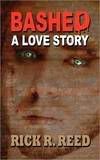 MLR Press / March 2009
MLR Press / March 2009
Reviewed by: T.E. Lyons
This suspense novel, which dips modestly into the supernatural, merits appreciation for its well-executed dance between sensitivity and intensity.
This is a story of gay bashing. Specifically, the aftermath of a bashing on a cold night in Chicago, recounted in the prologue. By the time the novel proper has begun, the assailants are scattered and the victims picked up by ambulance. Then 20 short chapters follow the main participants — plus one person who enters the scene only later. He may be the next victim, or he may be something else entirely in this close-knit narrative. The point of view shifts around, including two of the bashers — but most often it belongs with Donald, who lost his lover and partner.
Donald awakens in the hospital and begins both recovery and grieving. Though he finds support from some reliable sources, sympathy and acceptance aren’t universal, and the man sets up emotional walls of self-defense. Within these walls, he sees – then begins to feel – a presence. A familiar one. The one he’d most like to have with him. But is it just a product of his fractured mind?
Reed is an established brand — perhaps the most reliable contemporary author for thrillers that cross over between the gay fiction market and speculative fiction. In this tale, he maintains a degree of empathy across the viewpoints. Yet it’s also very clear that the author wants the reader to gain a deep understanding of what Donald is going through. The careful, watchful following of Donald’s progress (and sometimes lack thereof) drags the read by just a hair…
…but then, watch out! As he tries to figure out steps to rebuild his life and confidence, Donald returns to the leather scene at Chicago’s gay bars. Over a single chapter, the narrative stirs up an erotic storm (with occasional squalls following through the rest of the book). The sex scenes are not going to be to every reader’s tastes — even those who are okay with the explicit content might be put off by the whiplash-quick shift in tone. But it isn’t a shift in character: this is part of Donald’s road back, and part of what bashers want to take away. Reed does a great job of maintaining authorial voice in a slalom of heat and bittersweetness as Donald returns to where he first met his lost love.
Bashed has a few coincidences that pile up, but those distractions aren’t significantly detrimental because of the depth of characters throughout. Donald’s sister, a police sketch artist, the doorman at the bar and many others have individuality but aren’t pumped up with affect or artifice. The fears and needs of the bashers aren’t uniform or preordained. The suspense grows realistically as Donald re-enters the world with its inherent dangers.
If the unearthly element had retained its initial possibilities, the impact of this brief novel might have held on to an even wider audience. But what Reed delivered is still quite substantial.
Purchase Bashed: A Love Story by Rick R. Reed.
Evil At Heart / Chelsea Cain
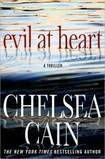 Minotaur Books / September 2009
Minotaur Books / September 2009
Reviewed by: Martel Sardina
Heartsick, Chelsea Cain’s first novel about a female serial killer named Gretchen Lowell, blew this reviewer away. My reaction to Sweetheart, its sequel, was mixed. On one hand, Cain had matured as writer. The story was tight. But with the exception of one key piece of information about Detective Archie Sheridan’s relationship with Lowell, I didn’t feel like Cain had covered much in the way of new ground. In Evil at Heart – the third book in the series – Cain does cover new ground, taking the series in an unexpected direction. And had I not read Gillian Flynn’s Dark Places earlier this year, I might have been more impressed. The two stories share a common element – the killer’s fan club.
In Dark Places, Flynn uses the fan club to build tension and suspense into her story. Cain’s use of this element shifts the story into something out of a slasher film. And while those who enjoy slasher films may appreciate this aspect of Evil at Heart’s plot, readers looking for the thrill of escalating suspense may enjoy Flynn’s take on the killer’s fan club more.
Evil at Heart opens with Archie sequestering himself in the safe confines of a mental hospital. He and Gretchen have called a truce of sorts. Archie won’t kill himself so long as Gretchen doesn’t kill anyone else. However, when a body turns up bearing Gretchen’s signature – an etched heart – it appears that Gretchen isn’t keeping her part of the bargain. As much as Archie would like to forget Gretchen, he can’t. The Beauty Killer has become a cult hero. From t-shirts to crime scene bus tours, the public just can’t seem to get enough of her. This may have been an attempt on Cain’s part to call society’s fascination with murderers into question, but any judgments made on that issue where nullified by Cain’s choice to make the violence in this book more graphic and visceral than its predecessors.
Recurring characters, like reporter Susan Ward and Archie’s partner, Henry Sobol, are also back to help him this time around, although Cain doesn’t provide much new insight into either character. They seemingly exist to both help and hinder Archie in his pursuit of Gretchen. And as much as I like all of Cain’s characters, even I am having a hard time believing that these three “good” guys would continue to withhold critical information from one another, especially where Gretchen Lowell is concerned. At times, their actions seem forced, contrivances designed solely to help Cain get from point A to point B.
Cain has again crafted an entertaining page turner. New readers may enjoy this book as a stand alone more than those who have read the first two. Cain has left the possibility for another installment open. As a fan of her writing, I would like to see her abandon Archie and Gretchen for a while and prove that she is more than a one trick pony.
Purchase Evil at Heart by Chelsea Cain.
A Twisted Ladder / Rhodi Hawk
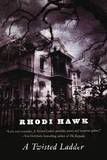 Forge / September 2009
Forge / September 2009
Reviewed by: Joan Turner
Like the mighty Mississippi meanders down to the Gulf twisting and sometimes turning back upon itself, Rhodi Hawk’s ambitious debut novel spans the lives of the current generation of New Orleans’ LeBlancs and the family lineage back to 1912.
At the heart of the present day story is Dr. Madeleine LeBlanc, a psychologist at Tulane University who has based her career on working to discover the cause of her father’s schizophrenia. Often violent, sometimes disappearing for months at a time, Daddy Blank – as he is known throughout New Orleans – left Madeleine and her brother, Marc, to grow up practically alone on the bayou. Now he still refuses the medication that would keep him stable. Madeleine hopes by understanding the illness, she can find the cure.
When a family tragedy strikes and Madeleine herself shows symptoms of mental illness, she suspects the disorder may be generic and that her 114-year-old great grandmother, Chloe, may hold the key to the mystery. As she explores her family’s past, a childhood friend-turned-psychotic killer becomes a dangerous problem.
The story flashes back to Hahnville, Louisiana, 1912, and the LeBlanc’s sugar plantation, Terrefleurs, where young Chloe, already skilled in Voodoo and Houma medicine, is servant of Helen, wife of plantation owner Remi LeBlanc.
Helen dies suddenly, her death blamed on “worker’s sickness,” a disease contracted from caring for evacuees of the recent flood. Shortly afterward, Remi notices a foreign substance in his food, and next morning he finds a gris-gris – a magical charm of bones, feathers, and herbs – in his bed. Chloe is working her river magic, and not surprisingly, she soon becomes his companion.
Growing mental problems drive Remi to the bottle for comfort, and as he loses his grip on reality, Chloe takes over the plantation, gaining complete control and engaging in illicit means to keep the plantation solvent. She rules with an iron hand and is determined that the couple’s four children learn and carry on the dark arts they have inherited from her.
The novel’s title refers to DNA, a double helix containing the nucleic acids that usually form the basis of heredity. The book explores the possibility that intuition, clairvoyance, and other psychic phenomena might be passed on from one generation to the next.
To substantiate her theme, Hawk gives the family’s history a predominant place in the story, placing it on almost equal footing with the present and constantly switching between the two. But this method of plotting is not without its drawbacks. The reader is continuously aware that much of the action has already occurred. Thus the frequent switches in time and place are not only a distraction, they eliminate much of the suspense. Reducing the back story to parts that relate directly to the current situation and focusing on the present might have helped the novel read more smoothly and have eliminated much of the verbosity. But despite these problems with the novel’s narrative structure, the subject matter is fresh and intriguing and the author handles characterization and scene ably.
A Twisted Ladder is an impressive first novel and the first in a series from an author that shows real promise. (In fact, Hawk won the International Thriller Writer’s Scholarship for an early draft of A Twisted Ladder.) Rhodi Hawk is a name to watch.
Purchase A Twisted Ladder by Rhodi Hawk.
John Dies at the End / David Wong
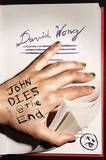 Thomas Dunne Books / October 2009
Thomas Dunne Books / October 2009
Reviewed by: Martel Sardina
As a writer, it’s hard not to root for David Wong’s success once you know the story of how John Dies at the End came to be published. Wong’s (aka Jason Pargin, Editor of Cracked.com) story started as a serial novel posted on a blog that was downloaded over 70,000 times. Through a series of fortunate events, the online phenomenon garnered the attention of Permuted Press and ultimately the interest of Thomas Dunne Books, resulting in this hardcover release. Although this backwards journey is the antithesis of the traditional route to print publication, it makes perfect sense considering the story itself is surreal.
When some of the kids living in the Midwest town of [Undisclosed] try a new drug called Soy Sauce, they soon learn why they should have just said no. The unstable substance has properties that go beyond mind altering. Soy Sauce allows its users to travel between time and across dimensions. It also has opened a portal and evils from another world are seeping into ours. Now, it is up to John Smith [not his real name] and David Wong [not his real name], two college drop outs, to save the world. They are the only ones who have tried Soy Sauce and survived. Their quest to save the world takes them from [Undisclosed] to Las Vegas and back, battling monsters of all sorts. Some are shadowy figures and others are beasts that have a Lovecraftian feel.
John Dies at the End is classified as horror. There are monsters. Is should be scary, right? Should be — but isn’t. The story is chock-full of laughs. Wong has a unique outlook on Midwestern living and his observations are quite entertaining. Unfortunately, these observations tipped the scales toward the comedic. The reader is never allowed to fear what is to come. When scary things happen, there is always a punchline. (And in many instances, it’s variations of the same joke.) The punch lines spoil any pent-up tension. Without the tension, readers will find it harder and harder to want to keep reading.
Another misstep was the choice Wong made in how to tell the story. About twenty pages in, readers learn that David is relaying his story to a reporter named Arnie Blondestone. The story is told essentially in a flashback. There are occasionally breaks in the action, bringing readers back to the present conversation between David and Arnie. When these breaks occur, Arnie doubts that what David is telling him is true. In the first two hundred pages, it was easy to believe in David, that his experience was plausible. With each break, readers are pulled out of the story. Everything that was great in the first two hundred pages of the book becomes contrived and annoying by the end.
This reviewer realizes that she might be in the minority, but John Dies at the End did not live up to the hype. Should you see it at your local library and want to read something humorous, pick it up. But those seeking scares should look elsewhere. Wong fails to deliver.
Purchase John Dies At The End by David Wong.
Shadow of the Dark Angel / Gene O'Neill
 Bad Moon Books / June 2009
Bad Moon Books / June 2009
Reviewed by: Derek Clendening
Very seldom can an author successfully pen a dark mystery novel while showing so many of his cards yet leaving a great deal to the imagination. But that’s exactly Gene O’Neill’s style in Shadow of the Dark Angel. We are granted an inside glimpse of a killer’s life that reveals what makes him tick — but without the trickery or childhood regression that other dark scribe’s have used to justify their killers’ motives. Our killer certainly has his share of quirks, and O’Neill has molded something much different than a Hannibal Lecter carbon copy.
Returning to the idea of O’Neill showing us his cards, this novel isn’t the same as your basic whodunit mystery. Shadow is more of a why-dunit. Yes, we have our investigator – or investigating duo to be precise – but O’Neill doesn’t force the reader to wait until the end of the novel for the killer’s reveal. Since the reader already knows who the killer is, they are left to try and make sense of his motives.
Indeed, this killer’s motives are different from those of other literary slayers because he is influenced by inhuman forces. How the killer is presented is also unique. O’Neill uses a literary technique that is relatively uncommon to the horror genre; namely, a variation in point of view throughout the novel. In scenes that concern our killer, he writes from a second person point of view that seems to address the killer, which might lead to speculation that the narrator is actually the killer’s conscience. The narrator could be giving him direction. The killer seems unable to think on his own and uses the narrator as a crutch.
Given Bad Moon Books’ track record for quality from both the literary and production side of the business, one can expect that this reissue will be something to be excited about. Shadow of the Dark Angel was originally published by Prime Books in 2003 but is being re-released now that O’Neill has seen somewhat of a resurgence in his popularity. A Bram Stoker Award finalist for his novella The Confessions of St. Zach, O’Neill again proves himself to be a talent who should have stepped into the limelight long ago.
Purchase Shadow of the Dark Angel by Gene O’Neill.




